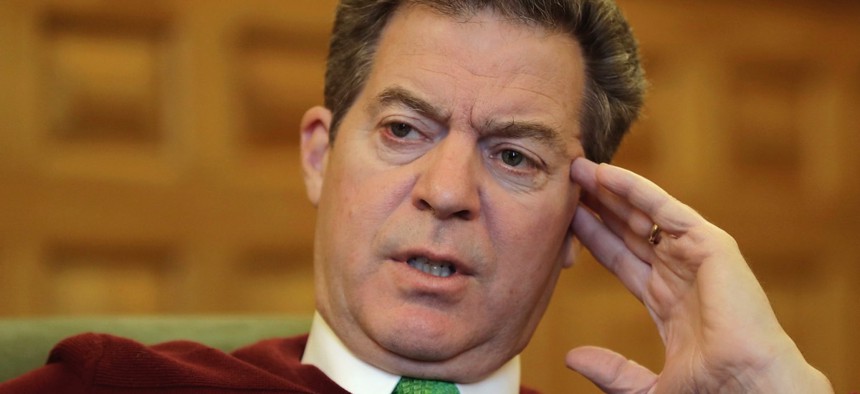The Budget Mess Continues in Kansas

Kansas Gov. Sam Brownback Charlie Piedel / AP Photo

Connecting state and local government leaders
Kansas Gov. Sam Brownback recently told The Kansas City Star: “I want a fairer tax system, but it’s like that was all counter to my policies.” Good luck replenishing that bone-dry rainy day fund.
Kansas lawmakers hope to begin filling the state’s newly established rainy-day fund in 2017, despite a $350 million budget deficit, $580 million projected revenue shortfall and Gov. Sam Brownback’s posturing.
Previous budgets included income tax reductions while failing to hit revenue goals, driving voters in November to elect only 44 of 84 candidates endorsed by the Kansas Chamber of Commerce’s political action committee. Chamber PAC had great success getting conservative Republicans elected in 2010 and 2012, but less so beginning in 2014 as voters soured toward tax inequity and irresponsible funding of education, transportation and social services.
Lacking a mandate, the Republican governor has opted to paint himself as a champion of small government in the face of perceived media slights labeling Brownback as anti-education and holding him to his administration’s own performance estimates.
“These days, however, media imaginations have concocted a new funding critique: liberal editorial boards are now blasting the Governor for NOT cutting K-12 education, for NOT cutting public safety, and for NOT cutting social services,” Brownback’s communications director, Melika Willoughby, wrote in a Friday grassroots newsletter posted on the governor’s website. “While the media changes their argument, Governor Brownback is working hard to craft a balanced budget—one that doesn’t harm core services of government. He continues to search for efficiencies that allow government to meet the needs of Kansans while reducing the cost to taxpayers.”
Brownback has hinted he’s finally considering tax increases, reports the Hays Post, though definitely not a sales levy on services. He also defended the Limited Liability Corporation income tax exemption, a small business break large business have come to exploit.
Forced center-right, Brownback echoed some of the policies of newly electeds, like ending the raiding of highway construction funds, in a year-in-review interview with The Kansas City Star.
“Well, I want to put more money into education, highways, [and the] KPERS [pension system],” he told The Star. “I want a fairer tax system, but it’s like that was all counter to my policies.”
The 47th state to develop a rainy-day fund, Kansas’ lawmakers haven’t decided whether revenue declines, revenue declines below projections, disasters or some other metric will trigger its use.
According to the most recent available Fiscal 50 data from the The Pew Charitable Trusts’ States’ Fiscal Health program, Kansas has about two days of worth of reserve funds for government operations. The current median for the 50 states in fiscal 2016 is about 29 days.
State Sen. Laura Kelly, a Democrat, plans to introduce a constitutional amendment clarifying usage while also delaying a savings requirement a few years, until Kansas can pay off its expenses, according to The Topeka Capital-Journal. The state already regularly waives a rule requiring it end the fiscal year with a positive balance of 7.5 percent of expenditures.
The fact President-elect Trump’s administration has floated Brownback as a possible Agriculture secretary further complicates the budget picture in Kansas.
“If he’s thinking about Washington, he should stop,” state House Minority Leader Jim Ward, a Democrat, told The Star. “We’ve got a crisis in Kansas, more than one, that needs attention and we should stop playing around with this concept that he’s going … It’s time to focus on the problems of the people of Kansas, which is by the way the job he ran for.”
Dave Nyczepir is a News Editor at Government Executive’s Route Fifty and is based in Washington D.C.

NEXT STORY: The End of North Carolina's HB2?





